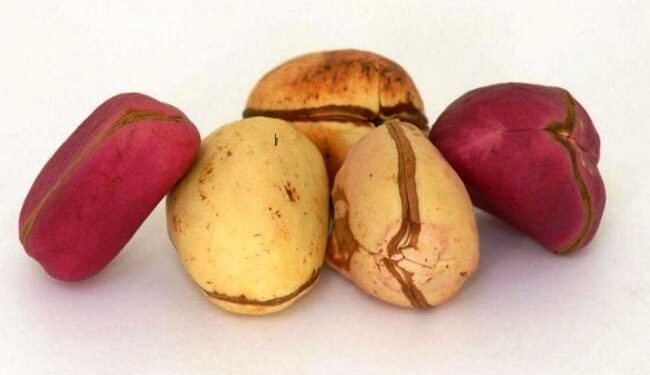Kola nut is popular in Nigeria and West Africa and is commonly consumed by pregnant women early in pregnancy to alleviate morning sickness and dizziness. There is, however, a practice that experts warn against, particularly when taken in larger amounts, because of its bad effect on the developing brain.
Many studies suggest that the intake of too many kola nuts in early pregnancy can induce abnormal changes in the baby’s developing brain because of the caffeine content in kola nuts. It also delays the maturation of the baby’s developing brain.
The developing brain, especially the cerebellum, is one of the earliest structures of the brain. It attains maturity months after a child is born. For this reason, the cerebellum is highly susceptible to developmental abnormalities and deviations from normalcy due to the effects of many chemicals and environmental pollutants.
A cross-sectional study involving 478 consenting pregnant women in all three trimesters in Ibadan metropolis, for instance, said in the 2022 report on Research Square preprint that 33.9% had consumed kola nuts in a previous pregnancy and 29.3% reported use in the current pregnancy. The majority (93.7%) used kola nuts to suppress symptoms of morning sickness like spitting, nausea, and vomiting.
In 2021, researchers in the laboratory demonstrated that kola nuts, when administered repeatedly at certain doses to pregnant dams, disrupt normal brain development in their pups, suggesting potential deleterious effects of excessive kola nut consumption on the human brain.
The pregnant animals were kept under close observation before, during pregnancy and after delivery.
This study to understand the potential effects of kola nuts on the newborn and juvenile human brains was done by Dr Foluso Atiba, Dr Innocent Imosemi and Professor Adefolarin Malomo at the University of Ibadan in conjunction with Dr Amos Fatokun at the Liverpool John Moores University, Liverpool, United Kingdom. It was published in the journal, PLoS ONE.
Pregnant Wistar rats were administered water (as control) or crude (aqueous) kola nut extract at 400, 600, and 800 mg/kg body weight orally, from pregnancy to day 21 after birth.
Kola nut administration was for a total of six weeks, starting at mating (beginning of pregnancy), continuing through the three weeks of pregnancy, and then ending three weeks after the pups were born. The pups were then weaned.
On days 1, 7, 14, 21 and 28 after birth, the pups were weighed before anaesthetised and sacrificed. Their brains were dissected out, weighed, and the cerebellum, a large part at the back of the brain that controls the muscles, movement, and balance, preserved in formalin for more tests.
It was observed that pregnant dams administered the kola nut extract were more active and aggressive than the negative control group dams that did not receive the extract. Also, the kola nut-treated dams showed some difficulty walking on the grid and flared their hind limbs when picked by the tails.
There was also evidence of impairment of motor control and posture (balancing) in kola nut-treated dams, as they showed some difficulty in walking on the grid and flared their hind limbs when picked by the tails.
Some days after the commencement of daily administration of the kola nut extract, some reduction in water and food intake of kola nut-treated pregnant dams was noticed. Then, the same week the dams had given birth (three weeks after kola nut administration commenced), weight loss in the kola nut-administered dams started to be seen.
Kola nuts are well known to suppress the function of hunger centres in the brain, and there is documentary evidence about ancient African soldiers who, after taking kola nuts, could go on for days without food. This known effect of kola nuts could also explain the subsequent loss of weight that started weeks after the administration of kola nuts commenced.
Also, the ingestion of kola nuts during pregnancy in the rats caused aberrant activity in the formation of the Purkinje cells, the large nerve cells that play a fundamental role in controlling movement. Damage was also seen in the brain’s white matter, demonstrating the toxic effect on the brain of certain doses of kola nuts.
The researchers declared that “our findings may necessitate public health campaigns to enlighten pregnant women in particular, and the entire population in general, about the potential risks of excessive or chronic consumption of kola nuts.
“It is also possible that the doses examined in this study are not quite representative of, or might be higher than, equivalent doses in humans that pregnant women or other people who ingest kola nuts are ever exposed to.
“Nevertheless, our work definitely shows that exposure to kola nuts in the womb or after birth, at least at certain dose levels, whether through excessive acute consumption or chronic accumulative consumption, could be detrimental to brain health and function in newborns and young individuals.”
Moreover, in the Nutrition Research journal, researchers also found a higher percentage of babies whose mothers took kola nuts (71%) who had a head circumference (30–35cm).
They investigated the relationship between kola nut ingestion during pregnancy and birth weight in 100 women who delivered at the Lagos Island Maternity Hospital, Nigeria. (Tribune)










Comments